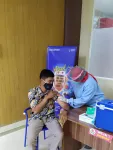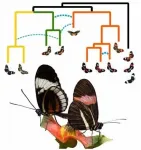Study finds vaccine hesitancy lower in poorer countries
New study examines vaccine acceptance and hesitancy in 10 low- and middle-income countries in Asia, Africa, and South America
2021-07-16
(Press-News.org) New research published in Nature Medicine reveals willingness to get a COVID-19 vaccine was considerably higher in developing countries (80% of respondents) than in the United States (65%) and Russia (30%).
The study provides one of the first insights into vaccine acceptance and hesitancy in a broad selection of low- and-middle income countries (LMIC), covering over 20,000 survey respondents and bringing together researchers from over 30 institutions including the International Growth Centre (IGC), Innovations for Poverty Action (IPA), WZB Berlin Social Science Center, the Yale Institute for Global Health, the Yale Research Initiative on Innovation and Scale (Y-RISE), and HSE University (Moscow, Russia).
Personal protection against COVID-19 was the main reason given for vaccine acceptance among LMIC respondents (91%), and concern about side effects (44%) was the most common reason for vaccine hesitancy. Health workers were considered the most trusted sources of information about COVID-19 vaccines.
The study comes at a critical juncture when vaccine shipments are still slow to arrive to the majority of the world's population, and COVID-19 cases are surging in many parts of Africa, Asia, and Latin America. The findings suggest that prioritizing vaccine distribution to low- and middle -income countries should yield high returns in expanding global immunization coverage.
"As COVID-19 vaccine supplies trickle into developing countries, the next few months will be key for governments and international organizations to focus on designing and implementing effective vaccine uptake programs," said Niccoló Meriggi, Country Economist for IGC Sierra Leone and study co-author. "Governments can use this evidence to develop communications campaigns and systems to ensure that those who intend to get a vaccine actually follow through."
The researchers, who conducted the surveys between June 2020 and January 2021, point out that vaccine acceptance may vary with time and with the information that people have available to them. While the evidence on the safety and efficacy of available COVID-19 vaccines has become more clear in the last six months, severe, but rare, side effects may have undermined public confidence.
Saad Omer, Director of the Yale Institute of Global Health and study co-author, said: "What we've seen in Europe, the US, and other countries suggests that vaccine hesitancy can complicate policy decisions, thereby hindering rapid and widespread vaccine uptake. Governments in developing countries can start engaging trusted people like health workers now to deliver vaccine messaging about side effects that is accurate, balanced, and easily available to the public."
"Across countries, we observe that acceptance of COVID-19 vaccines is generally somewhat lower than for other vaccines, perhaps because of their novelty. However, the consistently pro-vaccine attitudes we see in low and middle income countries give us reason to be optimistic about uptake," said Alexandra Scacco, Senior Research Fellow at the WZB and study co-author. "We hope that evidence from our study can help inform strategies to expand global COVID-19 vaccination."
INFORMATION:
[Attachments] See images for this press release:

ELSE PRESS RELEASES FROM THIS DATE:
2021-07-16
Engineers at UC Riverside have unveiled an air-powered computer memory that can be used to control soft robots. The innovation overcomes one of the biggest obstacles to advancing soft robotics: the fundamental mismatch between pneumatics and electronics. The work is published in the open-access journal, PLOS One.
Pneumatic soft robots use pressurized air to move soft, rubbery limbs and grippers and are superior to traditional rigid robots for performing delicate tasks. They are also safer for humans to be around. Baymax, the healthcare companion robot in the 2014 animated Disney film, Big Hero 6, is a pneumatic robot for good reason.
But existing systems for controlling pneumatic soft robots still use electronic valves ...
2021-07-16
Imagine an orange cat. Now, imagine the same cat, but with coal-black fur. Now, imagine the cat strutting along the Great Wall of China. Doing this, a quick series of neuron activations in your brain will come up with variations of the picture presented, based on your previous knowledge of the world.
In other words, as humans, it's easy to envision an object with different attributes. But, despite advances in deep neural networks that match or surpass human performance in certain tasks, computers still struggle with the very human skill of "imagination."
Now, a USC ...
2021-07-16
BUFFALO, N.Y. - Many legacy media outlets played an unwitting role in the growth of the four most successful fake Twitter accounts hosted by the Russian Internet Research Agency (IRA) that were created to spread disinformation during the 2016 U.S. presidential campaign, according to a study led by a University at Buffalo communication researcher.
In roughly two years beginning in late 2015, these accounts went from obscurity to microcelebrity status, growing from about 100 to more than 100,000 followers. With its heavily populated follower base ready to spread the word -- like all heavily engaged Twitter audiences -- the IRA could strategically deploy messages and provide visible metrics, creating an illusion of authority and ...
2021-07-16
As the Covid-19 pandemic raged, news reports show that sales of electronic air cleaners have surged due to concerns about airborne disease transmission. But a research team at the Georgia Institute of Technology has found that the benefits to indoor air quality of one type of purifying system can be offset by the generation of other pollutants that are harmful to health.
Led by Associate Professor Nga Lee "Sally" Ng in Georgia Tech's School of Chemical and Biomolecular Engineering and the School of Earth and Atmospheric Sciences, the team evaluated the effect of a hydroxyl radical generator in an office setting. Hydroxyl radicals react with odors and pollutants, decomposing ...
2021-07-16
A team of researchers from the University of Maryland has 3D printed a soft robotic hand that is agile enough to play Nintendo's Super Mario Bros. - and win!
The feat, highlighted on the front cover of the latest issue of Science Advances, demonstrates a promising innovation in the field of soft robotics, which centers on creating new types of flexible, inflatable robots that are powered using water or air rather than electricity. The inherent safety and adaptability of soft robots has sparked interest in their use for applications like prosthetics and biomedical devices. Unfortunately, controlling the fluids that make these soft ...
2021-07-16
Evolution is often portrayed as a tree, with new species branching off from existing lineages, never again to meet. The truth however is often much messier. In the case of adaptive radiation, in which species diversify rapidly to fill different ecological niches, it can be difficult to resolve relationships, and the phylogeny (i.e. evolutionary tree) may look more like a bush than a tree. This is because lineages may continue to interbreed as new species are established, and/or they may diverge and then re-hybridize, resulting in genetically mixed populations (known as admixture). Even after species diverge, the introduction of genes from one species to another (known as introgression) can occur. All of ...
2021-07-16
A UC San Francisco study has found that the antibiotic azithromycin was no more effective than a placebo in preventing symptoms of COVID-19 among non-hospitalized patients, and may increase their chance of hospitalization, despite widespread prescription of the antibiotic for the disease.
"These findings do not support the routine use of azithromycin for outpatient SARS-CoV-2 infection," said lead author Catherine E. Oldenburg, ScD, MPH, an assistant professor with the UCSF Proctor Foundation. SARS-CoV-2 is the virus that causes COVID-19.
Azithromycin, a broad-spectrum antibiotic, is widely prescribed as a treatment for COVID-19 in the United States and the rest of the world. "The hypothesis is that it has anti-inflammatory properties that ...
2021-07-16
ATLANTA--An oral prodrug developed by a team of scientists led by Binghe Wang, Regents' Professor of Chemistry at Georgia State University, delivers carbon monoxide to protect against acute kidney injury, according to a new paper published in Chemical Science.
Although carbon monoxide (CO) gas is toxic in large doses, scientists have discovered it can have beneficial effects by reducing inflammation and protecting cells against injury. Previous studies have demonstrated the protective effects of CO against injury in the kidneys, lungs, gastrointestinal tract and liver, among other organs. For the past five years, Wang and his collaborators have worked to design a safe way to deliver CO to human patients via prodrugs -- inactive compounds that ...
2021-07-16
The COVID-19 pandemic knocked many women off schedule for important health appointments, a new study finds, and many didn't get back on schedule even after clinics reopened. The effect may have been greatest in areas where such care is already likely falling behind experts' recommendations.
The study, by health care researchers in the University of Michigan END ...
2021-07-16
The hydrothermal vent fluids from the Gorda Ridge spreading center in the northeast Pacific Ocean create a biological hub of activity in the deep sea. There, in the dark ocean, a unique food web thrives not on photosynthesis but rather on chemical energy from the venting fluids. Among the creatures having a field day feasting at the Gorda Ridge vents is a diverse assortment of microbial eukaryotes, or protists, that graze on chemosynthetic bacteria and archaea.
This protistan grazing, which is a key mechanism for carbon transport and recycling in microbial food webs, exerts a higher predation pressure at hydrothermal vent sites than in the surrounding deep-sea environment, a new paper finds.
"Our ...
LAST 30 PRESS RELEASES:
[Press-News.org] Study finds vaccine hesitancy lower in poorer countries
New study examines vaccine acceptance and hesitancy in 10 low- and middle-income countries in Asia, Africa, and South America




